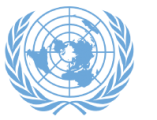New York - 8 May 2020 - The UAE emphasized that multilateralism and international cooperation remain essential to resolving global challenges at a meeting of the UN Security Council on the 75th anniversary of the end of the Second World War in Europe and lessons learned for preventing future atrocities.
“While we commemorate the end of the Second World War on European soil, its consequences had a direct impact in the Middle East that is not often part of the European narrative. The balance of power and geographic divisions made at the end of the First and Second World Wars by the victors determined the boundaries and new fault lines of the Middle East in a way that still has far-reaching ramifications today,” said H.E. Lana Nusseibeh, Ambassador and Permanent Representative of the UAE to the UN. “The world order that was forged from the ashes is the best safeguard we have for our collective security. In the midst of a pandemic, this discussion could not be more timely. As the world reels from the impact of COVID-19, the United Arab Emirates is committed to the reaffirmation of those founding principles of the UN.”
Ambassador Nusseibeh underscored that mass atrocities do not start with violence but start with the first signs of oppression against people based on their identity and with extremist propaganda. She noted that the signs of these divisions are emerging again today with hate speech and xenophobia around the world. In this regard, she reaffirmed the UAE’s commitment to preventing the further radicalization of young people in a region marred by sectarian violence, hegemonic agendas, and extremism.
Furthermore, Ambassador Nusseibeh stressed that the international community must not look the other way and must act early once warning signs are identified, adding that the UN Secretary-General, the Security Council, and individual Member States all have a role to play in preventing the onset of violence. She noted that the UAE continues to promote peaceful solutions in the region and around the world, and reaffirmed the UAE’s commitment to the UN Secretary-General’s call for a global ceasefire. “When prevention fails,” she said, “respect for the UN Charter, international law, and international humanitarian law is essential to mitigate the effects of armed conflict.”
“Whether it is in the context of mass atrocities or a global pandemic, history will judge us by whether we left anyone in our international community behind, especially the most vulnerable,” Ambassador Nusseibeh said. “They should remain at the center of our efforts today.”
The meeting was convened by the Republic of Estonia, the President of the Security Council for May 2020, and chaired by H.E. Mr. Urmas Reinsalu Minister of Foreign Affairs of Estonia. Fifty Foreign Ministers participated in the meeting. It also featured briefings by H.E. Mr Josep Borrell Fontelles, High Representative of the European Union; Ms. Rosemary DiCarlo, UN Under-Secretary-General for Political and Peacebuilding Affairs; and Mr. Timothy Snyder, Professor of History at Yale University.


